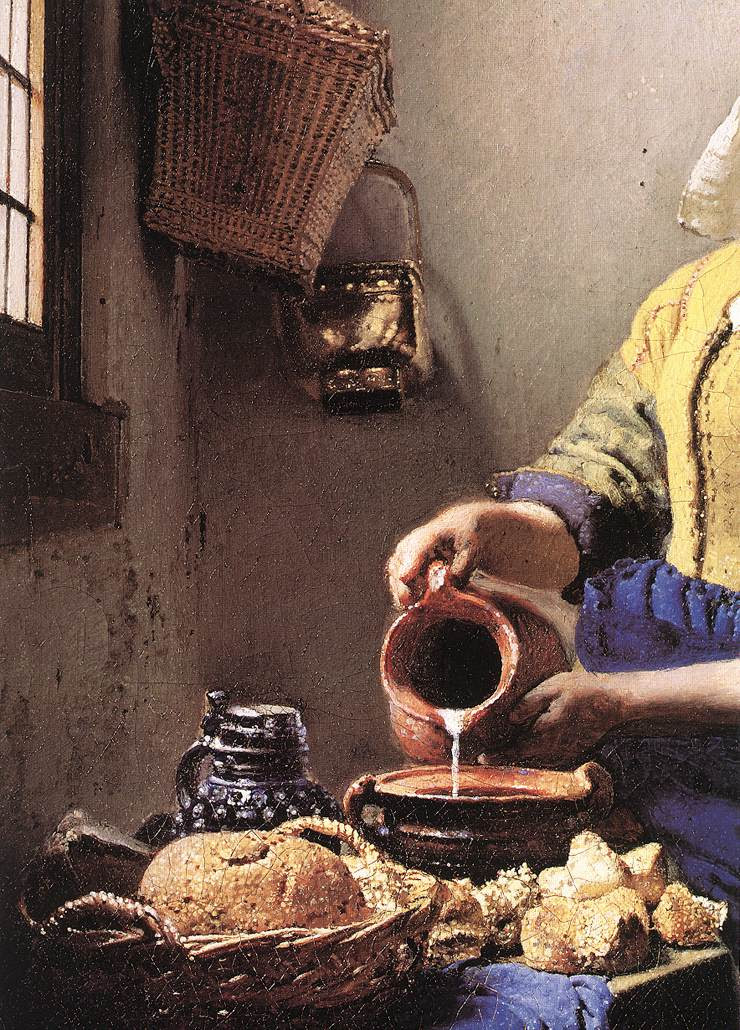.

A Lady and Two Gentlemen (detail): Johannes Vermeer, (1632-1675) c. 1659, oil on canvas (Herzog Anton Ulrich-Museum, Braunschweig)
XIII
The work is done. The hammer is laid down.
The artisans, that built the slow-grown town,
Have been succeeded by those who still built.
All this is something lack-of-something screening.
The thought whole has no meaning
But lies by Time's wall like a pitcher spilt.
The thought whole has no meaning
But lies by Time's wall like a pitcher spilt.

A Lady at the Virginals with a Gentleman (detail): Johannes Vermeer, 1662-65, oil on canvas (Buckingham Palace, London)

The Milkmaid (detail): Johannes Vermeer, c. 1658, oil on canvas (Rijksmuseum, Amsterdam)



11 comments:
I have always had trouble with the end of things. That moment when the work is done. When I think I should be relieved. When I look back and realize, it's already cracked. And there's that lack of something. Of course I'd rather to conclude that truth is beauty and not that the pitcher is split.
I love Pessoa, and the combination with Vermeer is perfect.
I have been enjoying this, puzzling over it, all morning. Every time I read something by Pessoa there's admiring puzzling going on. It's a superficial comment, I know, but reading this made me think about a conversation we had this morning concerning a friend's daughter. She's a recent college graduate, not ever trying to work at a job (I don't know whether she would be successful finding one; I know it's very tough for people in her situation), but she's being encouraged by her arty parents to follow her music muse as a performer and songwriter. The problem is that she's not a terrific songwriter yet and her singing isn't of professional quality. I compare her efforts to Pessoa's astonishing talent, writing stunning poetry in a language that wasn't even his native tongue, and think about lightning striking, etc. I had the same feeling about John Clare last night. Curtis
Nin,
That self-critical attitude seems to me the proper attitude for any serious artist -- though of course, self-satisfaction is much more convenient, and prevalent.
'In the eyes of those lovers of perfection, a work is never finished—a word that for them has no sense—but abandoned; and this abandonment, whether to the flames or to the public (and which is the result of weariness or an obligation to deliver) is a kind of an accident to them, like the breaking off of a reflection, which fatigue, irritation, or something similar has made worthless.' Paul Valery, Charmes. Le Cimetière Marin (1922)
Barry, if Valery, having got about as close to it as anybody, found perfection elusive, how could any of the rest of us ever dare to consider anything completed?
What I've always liked best about this bit of Pessoa, it must be confessed, is the wonderful nonce construction -- "something-lack-of-something" -- evidently created entirely out of the demands of the metrical situation, and for this occasion, and never to be used again.
But then this remarkable writer is surely the master of the one-off -- under whichever of his many aliases, and in every literary form he touches.
Bad enough for thought to be like a pitcher spilt. But to lie by Time's wall. How Pessoa's imagery captures the softness of liquid and hardness of stone. Thought doesn't have much of a chance, does it?
David
David,
Oh, poor thought! A meaningless shard of broken crockery, not even good enough to qualify as landfill!
These brilliant early simulations of classical inscriptions show the astonishing virtuosity in English of the very young Pessoa, and the muted "voice" in the shadows behind the epigrams must surely comprise one of the more interesting of this endlessly elusive writer's great many sock-puppet literary identities.
(I hear in this one a faint echo of Keats' Grecian Urn ode; that "slow-grown town" puts me in mind of the "little town" depicted on Keats's urn. And of course Pessoa would likely have read Keats in English, as a schoolboy in South Africa.)
I can't resist using this opportunity to share another achingly beautiful echo of Vermeer's bowls, jugs and pitchers - Velasquez and various Spanish still-lifers no doubt are in there too - and one that may not be familiar:
William Nicholson's 'The Lustre Bowl' (1911)
http://www.leslieparke.com/2010/10/william-nicholson-a-very-still-life/
Barry: Thank you for sharing the William Nicholson link. I was unaware of this artist and am extremely happy to have learned about him and his work. Curtis
Yes, Barry, thank you! What gorgeous paintings. "Miss Simpson's Boots" is almost shockingly intimate.
Paint becomes milk and thought a split pitcher.
Post a Comment